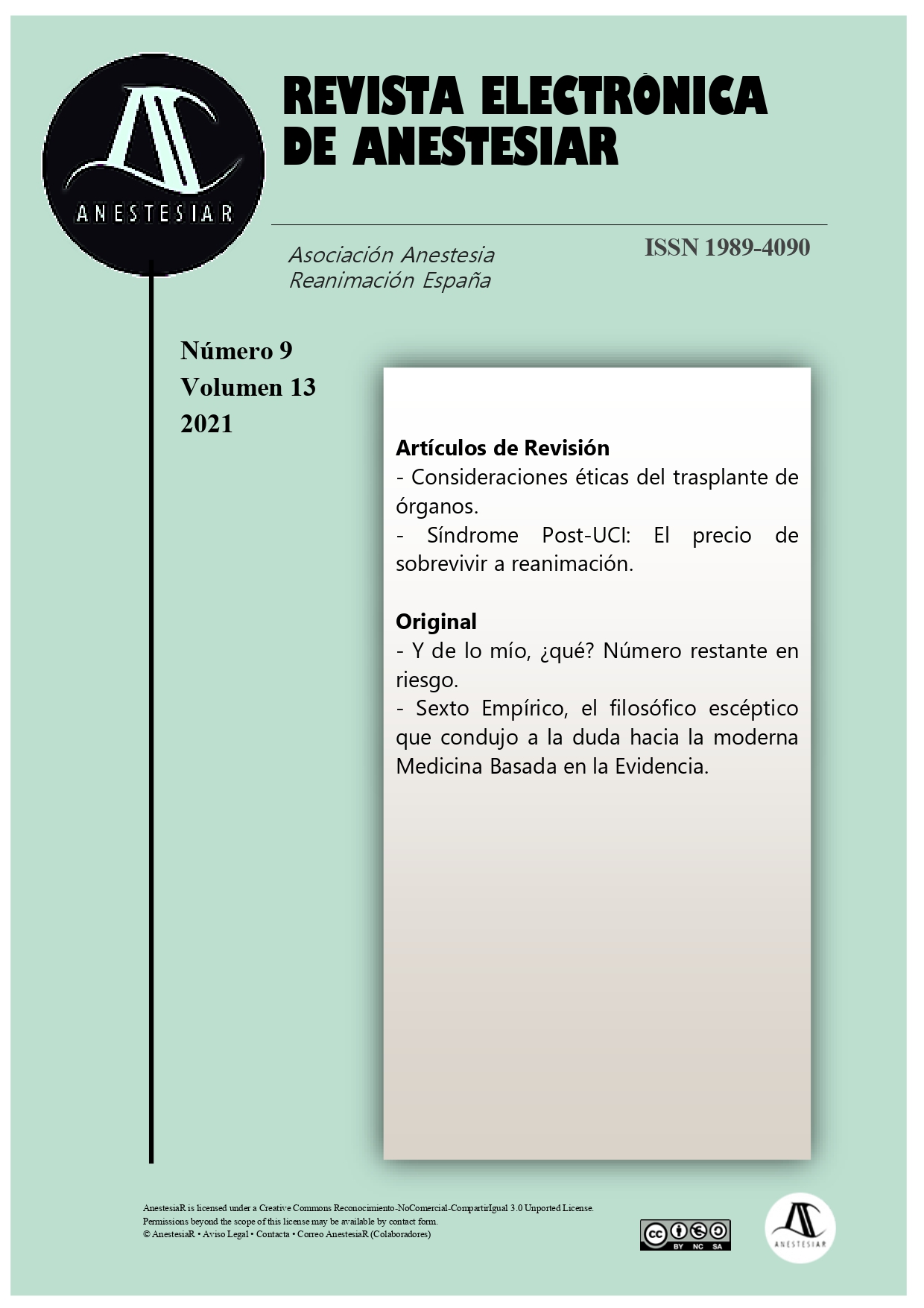Síndrome Post-UCI: El precio de sobrevivir a reanimación.
DOI:
https://doi.org/10.30445/rear.v13i9.956Palabras clave:
Cuidados intensivos, Síndrome post-uci, Rehabilitaci´ón precoz, Debilidad adquirida en UCI, rehabilitación, deterioro cognitivo, Síndrome de estrés post-traumáticoResumen
Realizamos una revisión de varios metaanalisis sobre los diferentes componentes (por separada) que engloban al síndrome post-UCI, dejando claro por un lado la definición del síndrome como un conjunto así como la sumatoria de los síntomas que engloba. Tras la búsqueda bibliográfica, analizamos las medidas en la práctica clínica que han demostrado reducir la incidencia de la disfunción cognitiva, mental o física y con ello la del síndrome post-UCI de manera que podamos llevarlas a cabo en la práctica clínica y concienciarnos a nosotros mismos y a todo el equipo de la importancia que tiene no solo el ingreso y la supervivencia de nuestros pacientes, sino la calidad de vida que les espera más allá de la reanimación.
Citas
Yende S, Austin S, Rhodes A et al. Long-term quality of life among survivors of severe sepsis: analyses of two international trials. Crit Care Med 2016; 44: 1461-7.
Needham DM, Davidson J, Cohen H, et al: Improving long-term outcomes after discharge from intensive care unir: Report from a stake-holders’ conference. Crit Care Med 2012; 40: 502-509.
Stevens RD, Marshall SA, Cornblath DR et al. A framework for diagnosing and classifying intensive care unit-acquired weakness. Crit. Care Med. 2009; 37: S299-308
Stevens RD, Downy DW, Michaels RK, Mendez – Tellez PA, Provonost PJ, Needham DM. Neuromuscular dysfunction acquired in critical illness: a systematic review. Intensive Care Med. 2007; 33: 1876-91.
Davydow DS, Katon WJ, Zatzick DF. Psychiatric morbidity and functional impairments in survivors of burns, traumatic injuries, and ICU stays for other critical illnesses: a review of the literature. Int Rev Psychiatry 2009; 21 (6): 531-8
Bienvenu OJ, Gerstenblith Ted-Avi. Posttraumatic Stress Disorder Phenomena After Clitical Ilness. Crit care clinics 2017; 33: 649-658
Pandharipande PP, Girard TD, Jackson JC et al. Long-term cognitive impairment after critical ilness. N. England. J. Med. 2013; 369: 1306-16.
Hopkins RO, Girard TD. Medical and economic implications of cognitive and psychiatric disability of survivorship. Semin Resp Crit Care Med 2012; 33 (4): 348-56.
Sosnowski K, Lin F, Marion L et al. Early rehabilitation in the intensive care unit: An integrative literature review. Australian Critical Care 2015; 28 216-225
Hermans G, Van den Bergue G. Clinical review: intensive care unit acquired weakness. Critical care. 2015; 19 (274)
Fuke R, Hifumi T, Kondo Y et al. Early rehabilitation to prevent postintensive care síndrome in patients with critical illness: a systematic review and meta-analysis. BMJ open 2018; 8 doi: 10.1136/bmjopen-2017-019998
Tipping, C.J., Harrold, M., Holland, A. et al. The effects of active mobilisation and rehabilitation in ICU on mortality and function: a systematic review. Intensive Care Med 43, 171–183 (2017). https://doi.org/10.1007/s00134-016-4612-0
Vanhorebeek, I., Latronico, N. & Van den Berghe, G. ICU-acquired weakness. Intensive Care Med (2020). https://doi.org/10.1007/s00134-020-05944-4
Lane-Fall M, Kuza C, Fakhry S, Kaplan L. The lifetime effects of injury. Anest Clinics 2019; 37: 135-150
Harvey M, Davidson J. Postintensive care síndrome: Right care, right now…and later. Critical Care Medicine. 2016 44(2):381-385
Inoue S, Hatakeyama J, Kondo Y, Hifumi T. Post-intensive care síndrome: Its pathophysiology prevention, and future directiones; Acute Medicine & Surgery; 2019; 6 233-246
Mehlhorn J, Freytag A, Schmidt K et al. Rehabilitation interventions for postintensive care syndrome: A systematic Review. Critical Care Medicine. 2014 42(5):1263–1271,
Chen YH, Lin HL, Hsiao HF, Chou LT, Kao KC, Huang CC, et al. Effects of exercise training on pulmonary mechanics and functional status in patients with prolonged mechanical ventilation. Respir Care 2012; 57 (5): 727-34.
Bailey P, Thomsen GE. Spuhler VJ, Blair R, Jewkes J, Bezdjian L, et al. Early activity is feasible and safe in respiratory failure patients. Crit care Med 2007; 35 (1): 139-45
NICE-SUGAR Study investigators, Finfer S, Chittock DR, Su SY, Blair D, Foster D, Dhingra V, Bellomo R, Cook D, Dodek P et al. Intensive versus conventional glucose control in critically ill patients. N Engl J Med 360:1283-1297.
Peris, A., Bonizzoli, M., Iozzelli, D. et al. Early intra-intensive care unit psychological intervention promotes recovery from post traumatic stress disorders, anxiety and depression symptoms in critically ill patients. Crit Care 15, R41 (2011). https://doi.org/10.1186/cc10003
Czerwibja AI, Herridge MS, Chan L, et al. Changing support needs of survivors of complex critical illness and their family caregivers across the care continuum: A qualitative pilot study of towards RECOVER. J Crit Care 2015; 30: 242-249
Jones, C., Bäckman, C., Capuzzo, M. et al. Intensive care diaries reduce new onset post traumatic stress disorder following critical illness: a randomised, controlled trial. Crit Care 14, R168 (2010). https://doi.org/10.1186/cc9260
Wang, S., Xin, H., Chung Lim Vico, C. et al. Effect of an ICU diary on psychiatric disorders, quality of life, and sleep quality among adult cardiac surgical ICU survivors: a randomized controlled trial. Crit Care 24, 81 (2020). https://doi.org/10.1186/s13054-020-2797-7
Devlin J, Skrobik Y, Gélinas C, Needham D, Slooter A et al. Clinical Practice Guidelines for the Prevention and management of Pain, Agitation/Sedation, Delirium, Immobility, and Sleep Disruption in Adult Patiens in the ICU. 2020 Crit Care Med 46 (9): e825-e873
Ramona O. Hopkins, Mary R. Suchyta, Gregory L. Snow, Al Jephson, Lindell K. Weaver & James F. Orme Jr. Blood glucose dysregulation and cognitive outcome in ARDS survivors, 2010 Brain injury 24:12, 1478-1484, DOI: 10.3109/02699052.2010.506861
Govindan S, Iwashyna TJ, Watson SR, Hyzy RC, Miller MA. Issues of survivorship are rarely addressed during intensive care unit stays. Baseline results from a statewide quality improvement collaborative. 2014 Ann Am Thorac Soc.;11(4):587–591. doi:10.1513/AnnalsATS.201401-007BC
Descargas
Publicado
Cómo citar
Número
Sección
Licencia
Derechos de autor 2021 Revista Electrónica AnestesiaR

Esta obra está bajo una licencia internacional Creative Commons Atribución-CompartirIgual 4.0.
 Envío y derechos de autor
Envío y derechos de autor


 Revista Electrónica AnestesiaR by
Revista Electrónica AnestesiaR by 